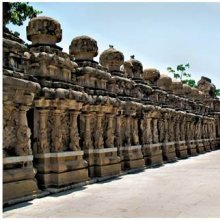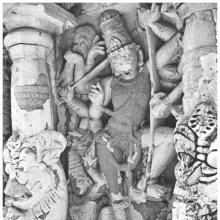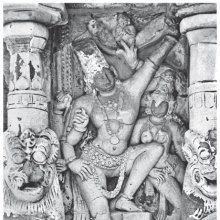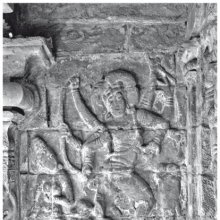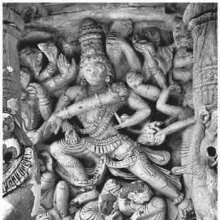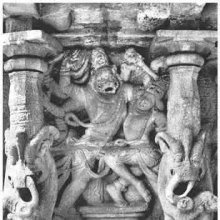Mur: 7 definitions
Introduction:
Mur means something in Hinduism, Sanskrit. If you want to know the exact meaning, history, etymology or English translation of this term then check out the descriptions on this page. Add your comment or reference to a book if you want to contribute to this summary article.
Images (photo gallery)
(+65 more images available)
Languages of India and abroad
Sanskrit dictionary
Source: DDSA: The practical Sanskrit-English dictionaryMur (मुर्).—6 P. (murati) To encircle, surround, encompass, entwine.
Source: Cologne Digital Sanskrit Dictionaries: Shabda-Sagara Sanskrit-English DictionaryMur (मुर्).—r. 6th cl. (murati) To encircle, to entwine, to bind together.
--- OR ---
Mur (मुर्).—f.
(-mūḥ) Fainting. E. murcch to faint, aff. kkip, the cha rejected after ra .
Source: Cologne Digital Sanskrit Dictionaries: Benfey Sanskrit-English DictionaryMur (मुर्).—i. 6, To circle, to surround.
— Cf. perhaps [Latin] mūrus.
Source: Cologne Digital Sanskrit Dictionaries: Monier-Williams Sanskrit-English Dictionary1) Mur (मुर्):—1. mur ([from] √murch), [Pāṇini 6-4, 21 [Scholiast or Commentator]]
2) 2. mur ([from] √murv), [cf. Lexicographers, esp. such as amarasiṃha, halāyudha, hemacandra, etc.]
3) 3. mur [class] 6. [Parasmaipada] murati, to encompass, entwine, bind together, [Dhātupāṭha xxviii, 53.]
4) 4. mur m. ([probably] [from] √mṝ; cf. ā-mur, abhi-pra-mur) a destroyer, slayer, enemy, [Ṛg-veda viii, 55, 2] ([Sāyaṇa] ‘a mortal’, others ‘a wall’).
Source: Cologne Digital Sanskrit Dictionaries: Yates Sanskrit-English Dictionary1) Mur (मुर्):—(śa) murati 6. a. To encircle.
2) (mūḥ) 5. f. Fainting.
[Sanskrit to German]
Sanskrit, also spelled संस्कृतम् (saṃskṛtam), is an ancient language of India commonly seen as the grandmother of the Indo-European language family (even English!). Closely allied with Prakrit and Pali, Sanskrit is more exhaustive in both grammar and terms and has the most extensive collection of literature in the world, greatly surpassing its sister-languages Greek and Latin.
See also (Relevant definitions)
Starts with (+1117): Mucrche, Mucrchetili, Mucrchevogu, Mucrchisu, Mur makki, Mura, Mura-amure, Mura-awuda-rajakariya, Mura-awudaya, Mura-palleru, Mura-saki-mukashi-yomogi, Muraa, Muraagwa, Murabamungu, Murabat-baitti, Murabatte, Murabba, Murabbi, Murabhid, Muracai.
Ends with (+17): Abhipramur, Amur, Athimur, Ban timur, Bhale timur, Bhui-dumur, Bogay timur, Bogey timur, Bokay timmur, Boke timmur, Chamur, Churmur, Dumur, Ghamur, Gulmur, Gurmur, Jagdoomur, Jagya-dumur, Jamur, Kakodumur.
Full-text (+29): Mura, Samveshtana, Abhipramur, Murari, Morata, Traf mur, Murarimishriya, Amur, Mur makki, Muradvish, Murarishripati, Murarigupta, Murajit, Murabhid, Murarinatakavyakhyapurnasarasvati, Muraripu, Muramardana, Muravairin, Murarinatakavyakhya, Murahan.
Relevant text
Search found 9 books and stories containing Mur; (plurals include: Murs). You can also click to the full overview containing English textual excerpts. Below are direct links for the most relevant articles:
Jules Supervielle (1884-1960) < [April 1969]
Rasa Jala Nidhi, vol 1: Initiation, Mercury and Laboratory (by Bhudeb Mookerjee)
Part 5 - Mercurial operations (3): Rubbing of Mercury (mardana) < [Chapter IV-V - Mercurial operations]
Sivaprakasam (Study in Bondage and Liberation) (by N. Veerappan)
Shuddha Avastha < [Chapter 3 - Understanding the Self]
A fragment of the Babylonian 'Dibbara' epic (by Morris Jastrow)
Blue Annals (deb-ther sngon-po) (by George N. Roerich)
Chapter 10 - Imperial lines of Tibet, China, Hor, etc. < [Book 1 - The beginning of the story of the Doctrine]
Chapter 13 - Staglungpa (i): Introduction < [Book 8 - The famous Dakpo Kagyü (traditions)]
Chapter 6 - First incarnation series (vii): rol pa'i rdo rje (Karmapa IV) < [Book 8 - The famous Dakpo Kagyü (traditions)]
Tibet (Myth, Religion and History) (by Tsewang Gyalpo Arya)
3. Early Zhangzhung Kings < [Chapter 2 - Zhangzhung Civilization]
